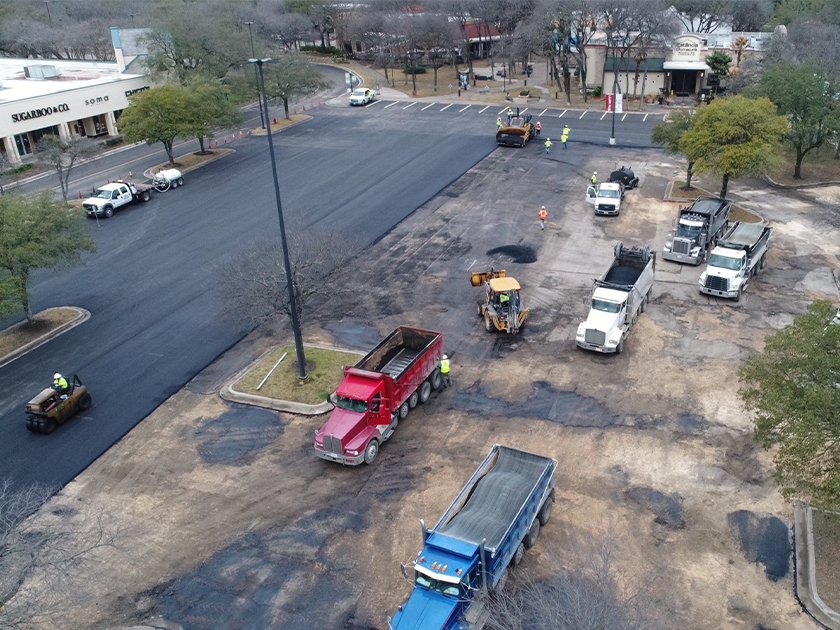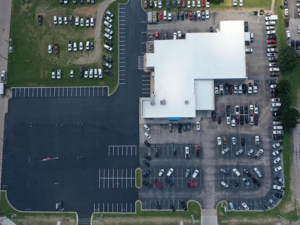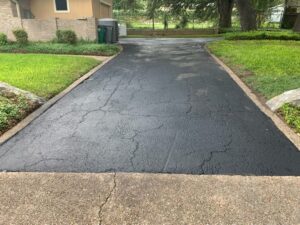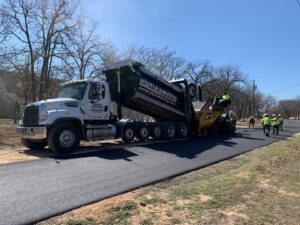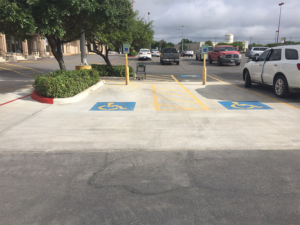 Asphalt is an excellent choice for constructing pavements of all types. City streets, large and small parking lots, sports courts, jogging trails, sidewalks, golf cart paths, and busy highways are just a few places to find asphalt pavement. Every asphalt and paving job can present unique challenges or have special requirements. However, certain facets of the job are relatively consistent across all types of pavements.
Asphalt is an excellent choice for constructing pavements of all types. City streets, large and small parking lots, sports courts, jogging trails, sidewalks, golf cart paths, and busy highways are just a few places to find asphalt pavement. Every asphalt and paving job can present unique challenges or have special requirements. However, certain facets of the job are relatively consistent across all types of pavements.
What Are the Steps for Asphalt Paving Installation?
What Is the First Step a Paving Company Takes When Installing Asphalt?
To ensure a successful paving job, your asphalt contractor needs a blank slate. If the site is unimproved land, there will likely be some vegetation or other debris to remove. If there is an existing pavement, he will demolish it and remove the rubble; there may be little or no demolition needed if the contractor is installing an asphalt overlay. The contractor can then proceed with the grading and sloping.
What Is Grading and Sloping?
The grade of a pavement refers to its elevation. Slope refers to the degree to which the pavement is angled both parallel and perpendicular to traffic. Your contractor or engineer will calculate the proper grade and slope to ensure that runoff will flow properly from the pavement. After this step, your Austin paving company can prepare the subbase.
What Is an Asphalt Pavement Subbase?
The subbase is the foundation that supports your asphalt pavement. Your contractor must prepare the subbase correctly. The depth of the subbase depends on the weight and volume of the traffic that the pavement will support. The subbase must be well-compacted to provide stability and strength that your pavement will need if it is to have a long, healthy life.
What Happens Next During an Asphalt Pavement Installation?
The next step is often a proof roll, but this is not necessary on every job or offered by all asphalt paving companies in Texas. The process involves driving a heavy truck or another piece of equipment over the compacted subbase. If the gravel flexes less than an inch, the subbase has proper support. If it flexes more than that, your contractor may need to repair some soft spots before proceeding with the binder course.
What Is the Binder Course?
The binder course is a layer comprised of large aggregates and oil. Its purpose is to enhance the strength of the pavement. The binder course lies on top of the subbase.
What Is the Wearing Course on an Asphalt Pavement?
The wearing course is sometimes called the surface course. It is the layer of asphalt on which pedestrians walk, and vehicles drive. Reputable commercial paving contractors go to great lengths to ensure that the wearing course will deliver a smooth ride and have an attractive finish.
What Else Does a Contractor Do When Installing Asphalt Pavement?
Since most pavements connect to other pavements, your contractor will ensure that the joints and transitions are smooth. The contractor will check to ensure that the pavement is draining correctly. The last step is the final roll. A roller truck will go over the entire pavement surface to ensure that it is smooth and properly compacted.
Why Does the Installation of an Asphalt Overlay Require Fewer Steps?
An overlay covers the top of an existing pavement. The pavement must have a relatively stable foundation, and potholes or other damage must be fixed before installing the overlay. The contractor can use a milling machine to remove the existing asphalt to a depth that can range from just a few millimeters to the entire pavement. There is no need to demolish the whole existing pavement, grade the site, or construct a subbase with an overlay.
For More Information, Contact Alpha Paving at Our Office in Round Rock, Texas
Alpha Paving provides a complete range of asphalt and concrete paving services, including initial construction, asphalt overlays, asphalt paving, and concrete repairs, parking lot striping and marking, pothole repairs, asphalt sealcoating, parking lot signs and car stops, road construction, thermoplastic pavement markings, speed bump installation, and asphalt milling. We serve customers throughout most of Central Texas, including many municipalities and counties, educational facilities, airports, hotels, health care facilities, religious institutions, and industrial facilities. We are known for the exceptional quality of our work, as well as our unparalleled customer service. For a free quote, call our office in Round Rock, Texas, at 512-677-9001 or use the online form.


